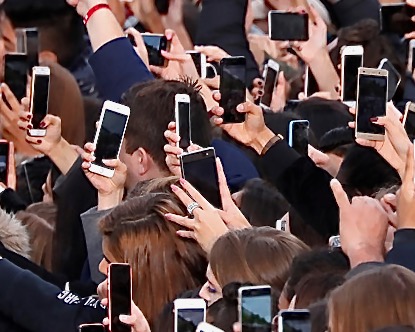Young people and athletes aren’t the only ones obsessed with others’ opinions, but granting that power is a dangerous decision likely to result in more harm than good.
 The dust-up over the threatening social media posts directed toward Ohio State forward E.J. Liddell after the Buckeyes’ upset loss in their NCAA Tournament illuminates much about our culture and the rancorous society in which we live.
The dust-up over the threatening social media posts directed toward Ohio State forward E.J. Liddell after the Buckeyes’ upset loss in their NCAA Tournament illuminates much about our culture and the rancorous society in which we live.
Technological advancements have given us great benefits over the last 30 years, but with those gains have also come great losses in civility and perspective.
The knucklehead who attacked Liddell on Instagram probably lost money on OSU’s loss to Oral Roberts. Either that, or just long ago lost touch with the ability to discern disappointment over a meaningless game from desperation over something truly meaningful in their life.
Liddell wasn’t wrong to expose the insanity or indefensibility of the messages he received. It could certainly be argued that it took courage to expose it, and the hope is Liddell’s transparency will make other morons think before they hit, SEND.

Bruce Hooley writes the Buckeyes and shares his insights as columnist at large for Press Pros Magazine.com.
You will never be able to educate them all, however, and so no amount of Liddell’s unmerited suffering or law enforcement investigation or any subsequent prosecution of the offending party will protect him, his teammates, or any athlete from this sort of thing happening again on social media.
Or you, either.
That power rests only in the hands of the person holding the device on which they read or see the hate directed toward them.
What started with the creation of the personal computer — which begat email, which begat instant messaging, which begat Facebook, Twitter, Instagram, Tik Tok and all other forms of digital savagery — differentiates this generation from all those before.
You used to leave the bully at work or school when you went home.
Now, you take them home with you in your pocket.
God made each of us with a longing for community, for affirmation, for friendship and for love. That used to come solely from those closest to us, but in a generation where everyone is only a swipe of the screen away from instant access to your undivided attention, people you don’t know, never met, and never will meet are invited to stand next to you and scream in your ear.
Their invective is the irresistible candy we all were once warned never to accept from strangers.
The country music star, Brad Paisley, sang about this in his hit song, “Online,” about a 5-foot-3, overweight loser who lived in his parents’ basement, but projected a much different reality on the internet.
“Online I’m out in Hollywood,
I’m 6-foot-5 and I look damn good,
I drive a Maserati, I’m a black belt in karate
And I love a good glass of wine…
“Online, I’m out in Malibu,
I pose for Calvin Klein, I’ve been in GQ,
I’m single and I’m rich
And I’ve got a set of six-pack abs that will blow your mind.”
“I’m so much cooler online,
…yeah, I’m cooler on line.”
Insults and insolence reproduce like rabbits on social media, where no shortage of electronic Hulk Hogan’s flex their cyber muscles in a never-ending battle for the loudest last word.
There’s good stuff out there, too, of course. Without that, no one would line up for the buffet that feeds our insatiable appetite for what others are saying about us.
If only the poison were clearly labeled before consumption. Instead, it’s always lurking amid the approval we crave, and so we keep gulping it down in hopes that the balance of good vs. bad will nourish our needs just enough to exceed the emotional toll it’s exacting.
None of this is new, of course. It’s just the latest evolution of the parasite that feeds off the insecurity in us all, which has been there since Eve picked the apple.
Unless you’re grounded in objective truth — not my truth, or your truth or other nonsensical elevations of feelings over fact — you’ll be ill-equipped to stand against the error that trips far too many.
A philosophy professor I encountered during my college years said something that has stuck with me ever since:
“I am who I think you think I am.”
 That’s a clever way of admitting our addiction to allowing others into our own minds, where self-identity is often shaped by the lies we believe to be true about ourselves.
That’s a clever way of admitting our addiction to allowing others into our own minds, where self-identity is often shaped by the lies we believe to be true about ourselves.
A few years after that prof tempted me with his mental poison, I remember the actress Sally Field’s acceptance speech after receiving her second Oscar.
Her second Oscar — not her first….her second, following one that came just five years earlier:
“I’ve wanted more than anything to have your respect,” she said. “This time, I feel it. And I can’t deny the fact that you like me. Right now, you like me.”
Right now…but maybe not tomorrow.
E.J. Liddell said that in a season when COVID protocols denied him and his Ohio State teammates the access to in-person contact they’d normally experience in class and away from the court, social media was a safe touch point to the personal connections they craved.
Next year won’t be any different, though, because there’s no vaccine to innoculate against the idiots and imbeciles hiding amid the allure of online affirmation.
The only place Liddell or any of the rest of us will find that approval free of animosity or agenda is from those select few in our lives who are heavily invested in our well-being without any expectation of a return.
Bruce Hooley is a former sports editor of the Troy Daily News and hosts the We Tackle Life podcast on iTunes and GooglePlay.

No matter of law enforcement investigation or prosecution of the offending party will protect any athlete from this sort of thing happening again on social media. That power rests only in the hands of the person holding the device on which they see the hate directed toward them. (Press Pros File Photos)



